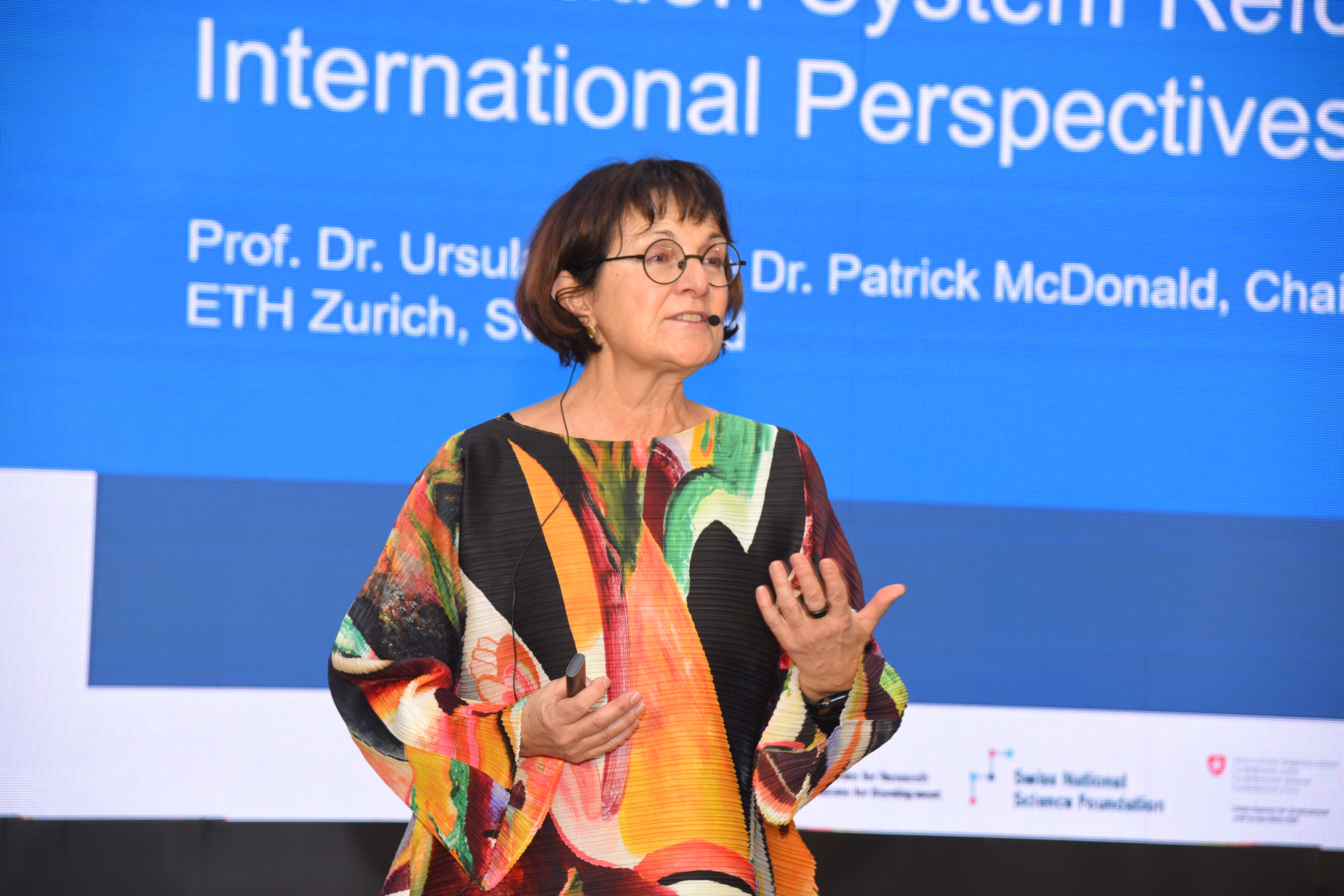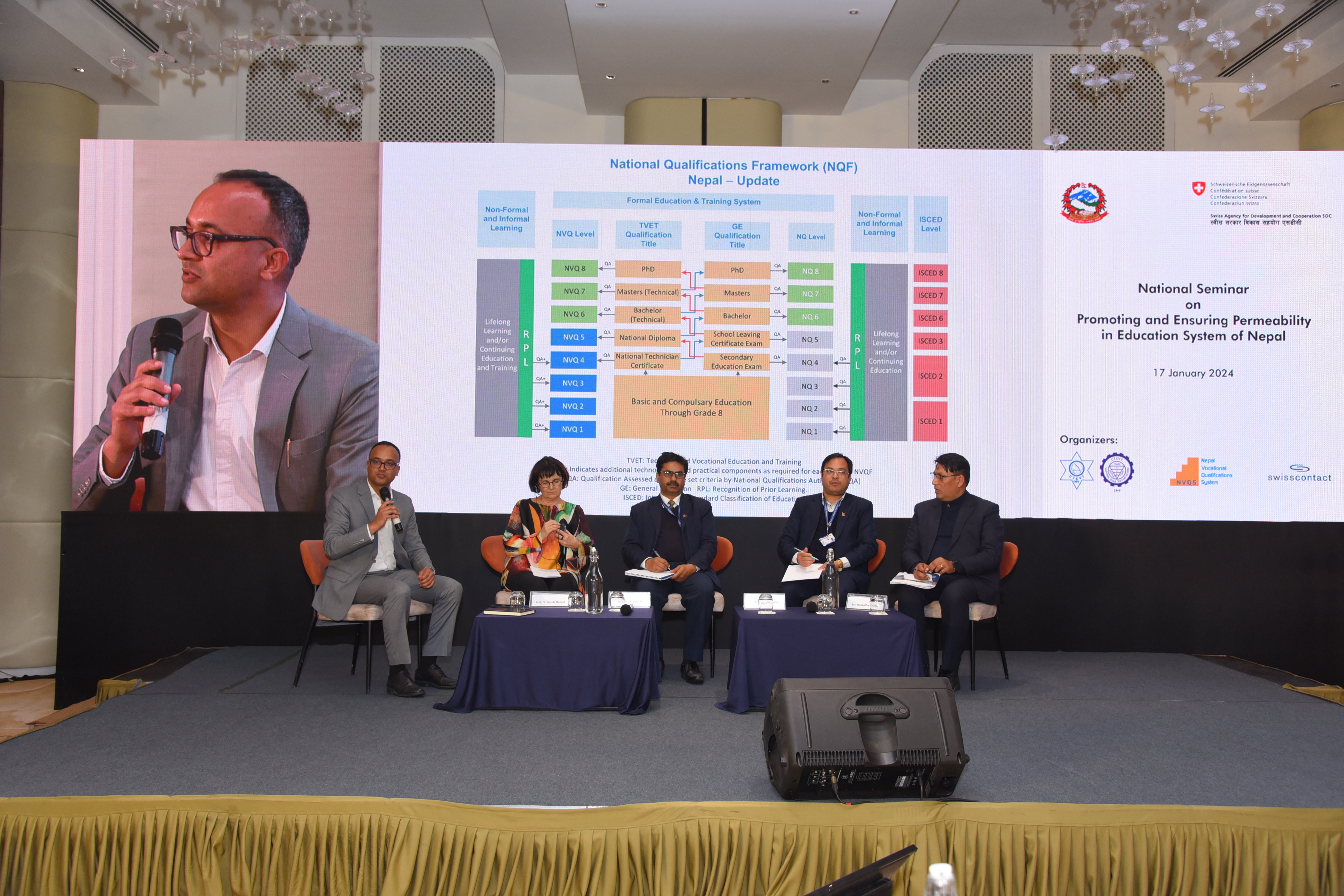National Seminar on Promoting and Ensuring Permeability in the Education System of Nepal: A Path to Progress
The National Seminar on Promoting and Ensuring Permeability in the Education System of Nepal, held on 17th January 2024 in Kathmandu, marked a significant milestone in understanding international experiences and advancing discussions on contextualizing permeability in Nepal's education system.
The seminar was organized by the Council for Technical Education and Vocational Training (CTEVT)/National Skill Testing Board (NSTB) in close collaboration with the Ministry of Education, Science and Technology and supported by the Nepal Vocational Qualifications System Project – Phase II (NVQS P-II). NVQS P-II is a bilateral initiative between the Government of Nepal (GoN) and the Government of Switzerland. Swisscontact, Swiss Foundation for Technical Cooperation, provides technical assistance to the project on behalf of the Swiss Agency for Development and Cooperation (SDC).
The event highlighted sustained efforts in implementing the NVQF by designing and implementing TVET courses at a higher level (NVQ Level 6 and above) in line with the NVQF, aiming to provide an attractive progression pathway to the young people in the country.
“This is a historic event for all stakeholders who have been working on implementing the National Qualifications Framework,” said Mr. Shiva Kumar Sapkota, Joint Secretary of TVET Division at the Ministry of Education, Science and Technology. He emphasized that very important and intensive discussions took place at the seminar on legal frameworks, policies, regulations, and coordination to build a permeable system in Nepal.
The event featured distinguished speakers and experts who provided valuable perspectives on international experiences related to permeable education systems. The event took off with a presentation from Prof. Dr. Ursula Renold from ETH, Zurich. Dr. Renold emphasized the importance of a strong technical and vocational education and training (TVET) system for boosting youth employment and economic development, presenting global best practices and ideas for Nepal.
“Nepal is a rockstar when it comes to a permeable framework,” said Dr. Renold. “We have worked in many countries, including the United States of America, and I can say that Nepal has the most progressive framework in place, and there has also been progression towards its implementation.”

In a broader sense, permeability involves procedures to recognize prior learning (RPL), enabling adults to re-enter the formal education system and obtain credentials. Dr. Renold underscores the significance of a fully permeable education system to make the TVET sector attractive and support economic development, as many program graduates will eventually enter the labor market.
Following Dr. Renold’s presentation, Dr. Anoj Bhattarai, CTEVT Director of Curriculum and Equivalence Division, discussed ongoing efforts to implement a credit accumulation and transfer (CAT) system in the TVET sector in his presentation. He also elaborated on how stakeholders from the TVET, General Secondary (GS), and Higher Education (HE) sectors can collaboratively address the identified issues and challenges.
Similarly, Mr. Raju Shrestha, Under Secretary at the Ministry of Education, Science, and Technology outlined higher education efforts aligned with the National Qualification Framework and Mr. Nilkantha Dhakal, Director of CEHRD, shared progress in non-formal and alternative education, focusing on Recognition of Prior Learning (RPL) in their respective presentations.
Following the presentations, guided discussions with facilitators and presenters as panel members allowed for interactive and insightful exchanges. Mr. Subas Subedi, Team Leader for NVQS P-II, facilitated the panel discussion, providing an opportunity for stakeholders to delve deeper into the issues surrounding permeability in Nepal's education system.

There were also some hard questions raised during the Q&A sessions, especially from the private sector. They also highlighted the importance and urgency of NQF implementation.
“We all have personal stories of struggle because of the lack of progression pathway in technical education. If it is not ours, then it’s our brothers or sisters or neighbors. We know this is a problem and there are many questions, but now it's time to seek answers,” said Sunita Nhemaphuki, an agricultural entrepreneur and also a member of the Sector Skill Committee (SSC) for Agriculture. SSC is also one of the initiatives initiated by NVQS P-II.
The seminar successfully achieved its objectives, including exchanging international perspectives on education permeability, updating progress on Nepal's education system, and discussing key issues and the way forward. The presence of over 135 key stakeholders, experts, and representatives from various sectors underscored the commitment to fostering a dynamic and collaborative environment for future initiatives.
The event was also broadcasted live from the National Skill Testing Board and Swisscontact Nepal Facebook pages and Microsoft Teams. There were a total of 150 participants joining the seminar virtually.
During their concluding remarks, both Mr. Mahesh Bhattarai, Member Secretary of CTEVT, and Mr. Khagendra Adhikari, Vice Chairperson of CTEVT, expressed their gratitude to the participants for engaging in a lively discussion and highlighting the commitment of stakeholders to enhancing education permeability in Nepal.